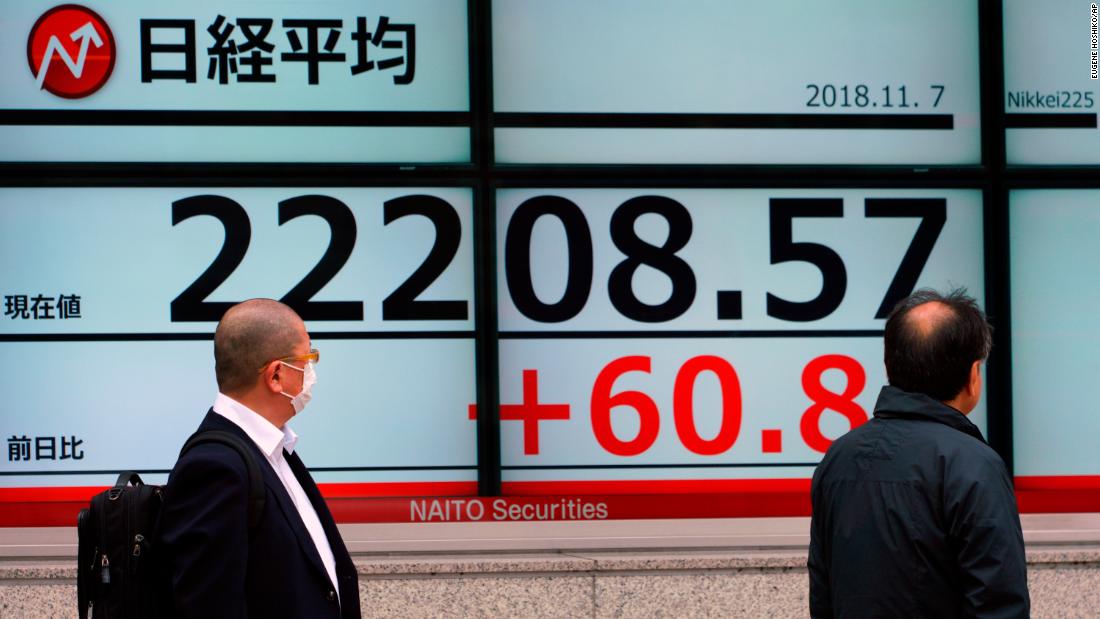
But don't expect any major surprises.
"Almost all Fed officials appear to be on board with gradual hikes towards the 'neutral rate,'" referring to the level that central bankers consider interest rates as neither accelerating nor halting economic growth, Jan Hatzius, chief US economist for Goldman Sachs, wrote in a recent note to clients.
Fed policymakers are set to gather in Washington on Wednesday and Thursday. The two-day policy-setting meeting comes a day after Americans vote in the midterm elections. Democrats retook control of the House -- a widely expected development that likely guarantees two years of gridlock in Washington and an array of fresh investigations into the Trump administration.
Fresh economic data since central bankers' last meeting has increased the chances of the Fed sticking with its plans to raise rates in December, and continue on its path of hiking interest rates gradually in 2019.
Employers added 250,000 jobs in October, easily surpassing expectations, and wages also grew a healthy 3.1% after years of American workers' paychecks stagnating.
But not everything is rosy. US policy makers are also contending with a strengthening dollar as interest rates rise and more recent market volatility just as other central banks take steps to end crisis-era stimulus programs.
Business investment rose only slightly in the third quarter due to ongoing trade rifts, despite the Trump administration's sweeping corporate tax cuts last year.
"We think the Fed will still characterize the economy as "strong," despite moderation is business fixed investment spending," Michael Gapen, chief US economist at Barclays, wrote in a note to clients.
In recent weeks, Trump has threatened that markets would fall if Democrats took the House. He also blasted his Fed chief, a former investment banker he nominated last year, as a "threat" to Republican control of Congress over a string of interest rate increases.
Although the Fed is widely expected to keep rates unchanged at this month's meeting, policy makers have already begun to telegraph they are prepared to dial up rates even further to keep the economy from overheating.
Newly appointed Fed Vice Chair Richard Clarida warned investors late last month they could expect "some" future rate hikes if the economy continues to grow at a steady clip.
"If strong growth and robust employment gains were to continue into 2019 and be accompanied by a material rise in actual and expected inflation, that circumstance would indicate to me that additional policy normalization might well be required beyond what I currently expect," Clarida said according to prepared remarks in an October 25 speech.
Even Powell has cautioned that central bankers might have to "move a little bit quicker" if they see the economy getting "stronger and stronger" and "inflation moving up."
Higher wages and a stronger labor market are good news for workers, but it makes the Fed's job that much trickier. Central bankers have been cautiously taking steps in recent years to prevent the economy from overheating by slowly lifting short-term interest rates.
Fed officials worry that such low unemployment and higher wages could speed up inflation, forcing the central bank to raise rates more aggressively, and tip the economy into recession.
Policy makers debated at last month's meeting how restrictive policy would need to be in the future with "a few" participants arguing that additional rate hikes may be necessary "for a time," while others would need to see clear signs of the economy overheating before taking further action.
For now, the Fed has sent strong signals it plans to stay the course. They are expected to leave their benchmark interest rates, which controls the cost of credit cards, mortgages and other borrowings, unchanged in a range of 2% and 2.25% at this week's policy meeting.
The Fed is widely expected to raise rates in December with a majority of participants now in favor of such a move. They've also previously signaled they expect at least three more rate hikes in 2019.
No comments:
Post a Comment